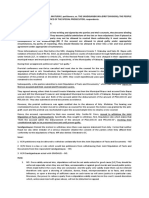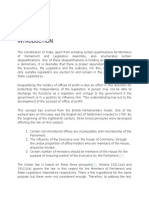Austria Vs AAA
Austria Vs AAA
Uploaded by
Liz MCopyright:
Available Formats
Austria Vs AAA
Austria Vs AAA
Uploaded by
Liz MOriginal Description:
Original Title
Copyright
Available Formats
Share this document
Did you find this document useful?
Is this content inappropriate?
Copyright:
Available Formats
Austria Vs AAA
Austria Vs AAA
Uploaded by
Liz MCopyright:
Available Formats
Austria vs AAA
Facts:
In 2006, the Regional Trial Court convicted Mamerto Austria, a school teacher, of five
counts of acts of lasciviousness committed against private complainants, both 11-year
old female students. Mamerto moved for reconsideration. Meantime, the trial judge
handling the trial cases was promoted. On August 15, 2008, the new presiding judge
resolved the motion and rendered joint orders acquitting Mamerto.
Private complainants were unsuccessful at a reconsideration. They then filed a special
civil action for certiorari to the Court of Appeals alleging that the new presiding judge
committed grave abuse of discretion since his Orders merely recited the contents of
Mamerto's motion for reconsideration without stating any factual and legal basis.
On July 31, 2012, the CA ruled in favor of private complainants and the Joint Orders
were declared void hence this petition of Mamerto for review on certiorari. He
questioned the legal personality of the private complainants to question his acquittal
since they cannot avail of a petition for certiorari without the participation of the Office
of the Solicitor General (OSG).
On August 3, 2021, the Court required the OSG to file a comment on the private
complainant’s legal standing in a criminal case. In its comment, the OSG stated that
only the OSG may question the judgments or orders involving the criminal aspect of the
case. However, it clarified that the private complainants may appeal insofar as the civil
liability of the accused in concerned, or file a special civil action for certiorari to
preserve his or her interest in the civil aspect of the case. In both cases, there is no
need to implead the State as the case involves purely private interests. Lastly, the OSG
gave its conformity to the petition for certiorari that private complainant filed before the
CA. The OSG argued that the trial court’s Joint Orders are void for failure to state
clearly the factual and legal bases of Mamerto’s acquittal.
Issues:
1. Whether the private complainants have the legal personality to question
petitioner’s acquittal
Ruling:
1. Yes.
The Court cited various jurisprudence wherein appeals or petitions for certiorari questioning the acquittal
of the accused, dismissal of the criminal case, and interlocutor orders rendered in the criminal proceedings
filed without consent or conformity of the OSG were dismissed because of lack of legal standing of
personality. Yet, there are instances where the Court allowed these appeals or petitions.
Given the divergent decisions on the private complainant’s legal standing in a criminal case, private
complainants cannot be faulted when they relied on jurisprudence allowing them to assail the criminal
aspect of the case through a petition for certiorari on grounds of grave abuse of discretion and denial of
due process. Hence, the Court did not dismiss their remedy.
There are divergent decisions on the private complainant's legal standing in a
criminal case-some petitions without OSG's conformint were granted and some
were dismissed. In this case, private complainants cannot be faulted when they
relied on jurisprudence allowing them to assail the criminal aspect of the case
through a petition for certiorari on grounds of grave abuse of discretion and
denial of due process. Hence, the Court did not dismiss their remedy.
In fact, the OSG joined the cause of private complainants, and gave its
conformity to the petition for certiorari that the private complainants filed before
the CA. TO avoid further delay, the Court deemed it more appropriate and practical to resolve the issue
of whether the CA correctly ruled that the RTC committed grave abuse of discretion which it did. when it
disregarded the constitutional requirement that a decision must express clearly and distinctly the facts and
the law on which it is based. The RTC was indeed guilty of grave abuse of discretion.
The Court then harmonized the case law and formulated an edifying rule on the
private complainant’s legal standing to question judgments or orders in criminal
proceedings consistent with its exclusive rule-making authority. Private
complainant has the legal personality to appeal the civil liability of the accused or
file a petition for certiorari to preserve his or her interest in the civil aspect of the
criminal case. The reviewing court shall require the OSG to file comment within a
non-extendible period of thirty days from the notice. On the other hand, private
complainant has no legal personality for those involving the criminal aspect of
the case or the right to prosecute, unless made with the OSG’s conformity. The
private complainant must request the OSG’s conformity within the reglementary
period to appeal or file a petition for certiorari. The reviewing court shall require
the OSG to file comment within a non-extendible period for certiorari questioning
the acquittal of the accused, the dismissal of the criminal case, and the
interlocutory orders in criminal proceedings on the ground of grave abuse of
discretion or denial of due process.
The petition of Mamerto was denied. The decision of the CA was affirmed with
modification.
You might also like
- Atwoods Rules For MeetingsDocument181 pagesAtwoods Rules For Meetingsapi-23968387867% (3)
- Rti & Media Law: University Institute of Legal Studies, Panjab University (Chandigarh)Document22 pagesRti & Media Law: University Institute of Legal Studies, Panjab University (Chandigarh)sssNo ratings yet
- Leviste V Hon AlmedaDocument2 pagesLeviste V Hon AlmedaDonvidachiye Liwag CenaNo ratings yet
- Austria Vs Aaa and BBBDocument2 pagesAustria Vs Aaa and BBBjessi berNo ratings yet
- Villarba Vs CADocument2 pagesVillarba Vs CALiz M100% (5)
- Conniving, Conspiring and Confederating With One Another, Did Then andDocument2 pagesConniving, Conspiring and Confederating With One Another, Did Then andMaverick Jann Esteban100% (2)
- Bumatay V. BumatayDocument2 pagesBumatay V. BumatayMikhel Beltran100% (1)
- Casupanan Vs Laroya Case Digest GDocument6 pagesCasupanan Vs Laroya Case Digest Gmaricel_aying50% (2)
- Enrile vs. People, 766 SCRA 1Document3 pagesEnrile vs. People, 766 SCRA 1imXinY100% (1)
- TY DE ZUZUARREGUI vs. VILLAROSADocument1 pageTY DE ZUZUARREGUI vs. VILLAROSAAl RxNo ratings yet
- Co V New Prosperity Plastic Products - Case DigestDocument2 pagesCo V New Prosperity Plastic Products - Case DigestMaria Angela Gaspar100% (2)
- Ivler Vs San Pedro DigestDocument3 pagesIvler Vs San Pedro DigestMM100% (9)
- 002 VIRGINIA DIO v. PEOPLE OF THE PHILIPPINES AND TIMOTHY DESMONDDocument2 pages002 VIRGINIA DIO v. PEOPLE OF THE PHILIPPINES AND TIMOTHY DESMONDjacky100% (1)
- Criminal Law People V. SolarDocument2 pagesCriminal Law People V. SolarAiza Lantud100% (2)
- 21 Corpus V PamularDocument7 pages21 Corpus V PamularArtemisTzy100% (3)
- People Vs DasmariñasDocument1 pagePeople Vs DasmariñasLiz MNo ratings yet
- People v. MagatDocument3 pagesPeople v. MagatTricia MontoyaNo ratings yet
- Bayas vs. SandiganbayanDocument2 pagesBayas vs. SandiganbayanKing Badong100% (2)
- Braza v. SandiganbayanDocument1 pageBraza v. SandiganbayanPau Ita asNo ratings yet
- People V LipataDocument2 pagesPeople V LipataRobert Rosales100% (5)
- Philippine Rabbit V People Case DigestDocument2 pagesPhilippine Rabbit V People Case DigestAbigail Tolabing0% (1)
- Gina Villa Gomez v. PeopleDocument5 pagesGina Villa Gomez v. PeopleGreta Fe Dumallay100% (4)
- People vs. Sergio, G.R. No. 240053, October 9, 2019 DigestDocument1 pagePeople vs. Sergio, G.R. No. 240053, October 9, 2019 DigestCharmila Siplon100% (2)
- Co V New Prosperity Plastic ProductsDocument1 pageCo V New Prosperity Plastic ProductsHariette Kim TiongsonNo ratings yet
- People vs. Bayabos Et AlDocument2 pagesPeople vs. Bayabos Et AlHoven Macasinag75% (4)
- PARTIES (P V R) MELKY CONCHA AND ROMEO MANAGUELOD V. PEOPLE OF THE PHILIPPINESDocument3 pagesPARTIES (P V R) MELKY CONCHA AND ROMEO MANAGUELOD V. PEOPLE OF THE PHILIPPINESSheraina Gonzales100% (1)
- D.1.1 January 10, 2018 G.R. No. 192971 FLORO MERCENE, Petitionervs. Government Service Insurance System, Respondent FactsDocument3 pagesD.1.1 January 10, 2018 G.R. No. 192971 FLORO MERCENE, Petitionervs. Government Service Insurance System, Respondent FactsEmmanuel Princess Zia SalomonNo ratings yet
- Daan V Sandiganbayan DigestDocument1 pageDaan V Sandiganbayan DigestJohn Evan Raymund Besid100% (4)
- Jaylo Vs SandiganbayanDocument2 pagesJaylo Vs SandiganbayanJ. Lapid100% (3)
- Recto vs. People of The PhilippinesDocument2 pagesRecto vs. People of The Philippineslinlin_17100% (1)
- People Vs GodoyDocument2 pagesPeople Vs GodoyLouie Raotraot67% (3)
- Leviste Vs CADocument2 pagesLeviste Vs CAsujeeNo ratings yet
- Bayas Vs SandiganDocument2 pagesBayas Vs Sandigansujee100% (1)
- People vs. Dela Torre-Yadao: Topic Date Case Title GR No DoctrineDocument2 pagesPeople vs. Dela Torre-Yadao: Topic Date Case Title GR No DoctrineJasen75% (4)
- Quisay V PeopleDocument2 pagesQuisay V PeopleeieipayadNo ratings yet
- Bernardo v. PeopleDocument3 pagesBernardo v. PeopleBeatrice AbanNo ratings yet
- Crespo V Mogul Case DigestDocument2 pagesCrespo V Mogul Case DigestLoraineSaguinsin100% (3)
- People Vs GiveraDocument1 pagePeople Vs GiveraKling King100% (1)
- Simon Vs ChanDocument2 pagesSimon Vs ChanMark Rainer Yongis Lozares100% (2)
- Cabador V People Case DigestDocument2 pagesCabador V People Case DigestAbigail TolabingNo ratings yet
- Cagang Vs Sandiganbayan FactsDocument2 pagesCagang Vs Sandiganbayan FactsLuiza Capangyarihan100% (4)
- Go v. People Case Principle: The Examination of Witnesses Must Be Done Orally Before A JudgeDocument2 pagesGo v. People Case Principle: The Examination of Witnesses Must Be Done Orally Before A JudgeCharisse Christianne Yu Cabanlit0% (1)
- People v. Romy LimDocument6 pagesPeople v. Romy LimCharmila Siplon50% (2)
- Dimayacyac V Ca: Dumlao, Carmela Paola R. Crimpro CasesDocument8 pagesDimayacyac V Ca: Dumlao, Carmela Paola R. Crimpro CasesCarmela Paola R. DumlaoNo ratings yet
- Dizon Vs PeopleDocument1 pageDizon Vs PeopleJerome Leaño100% (1)
- Hilario vs. PeopleDocument1 pageHilario vs. PeopleMACNo ratings yet
- People vs. AndradeDocument2 pagesPeople vs. AndradeTeoti Navarro Reyes100% (1)
- Datukan Malang Salibo vs. Warden - Rule 117 and Habeas CorpusDocument2 pagesDatukan Malang Salibo vs. Warden - Rule 117 and Habeas CorpusGrandeureign Ortizo100% (1)
- Callo-Claridad v. EstebanDocument3 pagesCallo-Claridad v. EstebanRostum AgapitoNo ratings yet
- PP Vs EllasosDocument2 pagesPP Vs EllasosThereseSunicoNo ratings yet
- Case Digest Art. 195-202Document15 pagesCase Digest Art. 195-202Alray Gloria100% (1)
- Digest - Esteban vs. AlhambraDocument2 pagesDigest - Esteban vs. AlhambraMM100% (2)
- Remedial Case DigestDocument2 pagesRemedial Case DigestMan2x Salomon100% (3)
- Ii. Jurisdiction v. Venue: C. Jurisdiction of Different CourtsDocument3 pagesIi. Jurisdiction v. Venue: C. Jurisdiction of Different CourtsRENGIE GALONo ratings yet
- 15 People V Jugueta JIMENEZDocument1 page15 People V Jugueta JIMENEZquasideliksNo ratings yet
- 09 - People v. NitafanDocument2 pages09 - People v. NitafanquasideliksNo ratings yet
- People V PangilinanDocument2 pagesPeople V PangilinanJien LouNo ratings yet
- People vs. EspinosaDocument1 pagePeople vs. EspinosaAphr100% (2)
- Quisay V PeopleDocument2 pagesQuisay V PeopleJohn Kenneth D. VillafuerteNo ratings yet
- 5,15 Okabe vs. Gutierrez and People vs. LadrilloDocument4 pages5,15 Okabe vs. Gutierrez and People vs. LadrilloInnah MontalaNo ratings yet
- Almero V PeopleDocument7 pagesAlmero V PeopleMp CasNo ratings yet
- Republic vs. Sereno, G.R. No. 237428, June 19, 2018Document66 pagesRepublic vs. Sereno, G.R. No. 237428, June 19, 2018Radny EnageNo ratings yet
- Austria v. AAADocument3 pagesAustria v. AAAdmabaniaNo ratings yet
- People Vs DasmariñasDocument1 pagePeople Vs DasmariñasLiz MNo ratings yet
- People Vs SolarDocument1 pagePeople Vs SolarLiz MNo ratings yet
- People Vs ZZZDocument1 pagePeople Vs ZZZLiz MNo ratings yet
- Case Digest DOJ Vs LacsonDocument2 pagesCase Digest DOJ Vs LacsonLiz MNo ratings yet
- People Vs Dela PeñaDocument2 pagesPeople Vs Dela PeñaLiz MNo ratings yet
- Landmark Judgments Under The POCSO Act, 2012Document3 pagesLandmark Judgments Under The POCSO Act, 2012swainlizza8465No ratings yet
- Amendment Procedure in USA, India and SwitzerlandDocument16 pagesAmendment Procedure in USA, India and SwitzerlandsharaNo ratings yet
- SANLES SANLES v. SPAINDocument9 pagesSANLES SANLES v. SPAINafdfrNo ratings yet
- MARY HELEN ESTRADA Versus PEOPLEDocument2 pagesMARY HELEN ESTRADA Versus PEOPLEBergancia marizbethNo ratings yet
- 151-P-Shyamala-V-Gundlur-Masthan - SECTION 28Document6 pages151-P-Shyamala-V-Gundlur-Masthan - SECTION 28Vinaylawer JoshiNo ratings yet
- Multi Party System Pol SCDocument20 pagesMulti Party System Pol SCKanchan VermaNo ratings yet
- CoA Perbadanan Pengurusan Trellises & Ors V Datuk Bandar Kuala Lumpur & OrsDocument60 pagesCoA Perbadanan Pengurusan Trellises & Ors V Datuk Bandar Kuala Lumpur & Orsralphgjk16No ratings yet
- Ipc Syllabus PDFDocument13 pagesIpc Syllabus PDFSnigdha DashNo ratings yet
- Office of ProditDocument11 pagesOffice of ProditAlister KNo ratings yet
- Format 20 Final Result Sheet Election To The House of The People From The 56 Parliamentary Constituency Part-IDocument4 pagesFormat 20 Final Result Sheet Election To The House of The People From The 56 Parliamentary Constituency Part-Ihd99054No ratings yet
- J&K HC - Akshay Kachroo N Anr Vs Dr. Ishita Ganjoo On 20 February 2017Document16 pagesJ&K HC - Akshay Kachroo N Anr Vs Dr. Ishita Ganjoo On 20 February 2017goyal1982No ratings yet
- Explainer - Inter-State Arrest, Transit Remand & Right To Legal RepresentationDocument12 pagesExplainer - Inter-State Arrest, Transit Remand & Right To Legal RepresentationSamarth AgarwalNo ratings yet
- Study Notes On Sierra Leone Legal SystemDocument37 pagesStudy Notes On Sierra Leone Legal SystemSheku Sandy100% (1)
- The Constitution of IndiaDocument160 pagesThe Constitution of IndiasahelNo ratings yet
- Criminal Procedure 2018 2019 Santiago 4Document368 pagesCriminal Procedure 2018 2019 Santiago 4zydjadelongnoNo ratings yet
- BOYEFIO V NTHC PROPERTIES LTDDocument14 pagesBOYEFIO V NTHC PROPERTIES LTDJunior AsamoahNo ratings yet
- dfghjkj3 3139rj 0dow0205kDocument2 pagesdfghjkj3 3139rj 0dow0205ktooparanoidformyrealNo ratings yet
- VI. Art 10 RPCDocument11 pagesVI. Art 10 RPCNaomi NodadoNo ratings yet
- SSRN Id4312024Document20 pagesSSRN Id4312024IzzyNo ratings yet
- Muthithi Investments Company Limited V Commissioner of Prisons &2 Others (2020) eKLRDocument4 pagesMuthithi Investments Company Limited V Commissioner of Prisons &2 Others (2020) eKLRRickcard BettNo ratings yet
- JudgementsDocument3 pagesJudgementsSana ParveenNo ratings yet
- Joyce vs. Director of Public ProsecutionDocument1 pageJoyce vs. Director of Public ProsecutionCarina FrostNo ratings yet
- Salonga V Holland 76 Phil 412Document2 pagesSalonga V Holland 76 Phil 412Lord Jester AguirreNo ratings yet
- Plaintiff's Rule 59 Motion To Alter or Amend The Court's November 22, 2002 OrderDocument13 pagesPlaintiff's Rule 59 Motion To Alter or Amend The Court's November 22, 2002 OrderSue Reynolds ReidNo ratings yet
- Group Discussion (LBT)Document30 pagesGroup Discussion (LBT)Acidri Francis (Counsel Acid)No ratings yet
- Organizational Chart of The Philippines GovernmentDocument4 pagesOrganizational Chart of The Philippines GovernmentMichael Keith RiambonNo ratings yet
- Kimura, Yumi R. Che - 1 / A13 2019102775: Answer Each Given Problem CompletelyDocument3 pagesKimura, Yumi R. Che - 1 / A13 2019102775: Answer Each Given Problem Completelyellie sereneNo ratings yet
- 2025 Bar Syllabus - Political Law and Public International LawDocument48 pages2025 Bar Syllabus - Political Law and Public International Lawelusivedot25No ratings yet






























































































